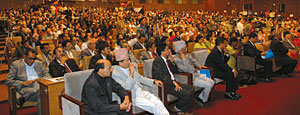 KIRAN PANDAY |
The Non-Resident Nepali (NRN) movement has come a long way since the London restaurant meeting in August 2003 of the dedicated core group that still provides much of its inspiration and leadership. As more and more Nepalis join the global diaspora our numbers have grown dramatically, but the purpose of the movement has become hazier and more confused.
Are NRNs just one more 'province' of a new federal structure with demands of dual citizenship, voting rights, special treatment and concessions on investments in Nepal? Or are we the new Patriotic Corps rallying under the (slightly confusing) slogan 'for Nepalis by Nepalis' to save the motherland?
Either perspective is valid. Under the former, the NRN Association is like the Nepal Medical Association or the Ex-Servicemen Association: doing its best to further advance the private and commercial interests of its members. In return, the members agree to a seemingly soft commitment to "strive to contribute to the overall development of Nepal".
But many NRNs, especially those in leadership, seem to confuse themselves with the development objective. They preach of a patriotic duty to rebuild a new Nepal with our advice, skills and resources. Again very laudable, though perhaps a bit fanciful.
What is reprehensible, however, is the effort to link these two with an unstated quid pro quo: you (Resident Nepalis) give us special rights, including dual citizenship, and we will bring in our skills and money to save you from doom.
This attitude is derived from three great myths about NRNs, namely:
* the best and brightest of Nepalis are living abroad
* our skills and investments are vital for Nepal's development
* directing our skills and investments back to Nepal is our patriotic duty.
Each of these is patently false, and most NRN members must already know that to be so. Resident Nepalis can judge for themselves whether all our talent has gone overseas, but the more egregious myth is the second one: the belief that NRN skills and resources directed back to Nepal are indispensable for Nepal's economic development.
One or two middle-rung Marwari business houses in Nepal can raise within two days whatever the global NRN Association can offer as investment funds for Nepal over the next two decades. Why then is NRN money more valuable than what local businesses with local knowledge can raise and invest within Nepal? If it is not about the quantity, is it about the quality of the funds? And in the specific case of Marwari investments, is it their ethnicity, and perhaps the dual citizenship of some, that is the problem? If that is so, the proposed dual citizenship of patriotic NRN investors is not problematic?
In fact, there is great danger to Nepal in willy-nilly providing special treatment for NRN investors relative to other foreign investors. A favoured status for the former may even discourage the much larger resources available from the latter. The thought paradigm of national versus international capital is outdated now. There is but one global capital pool. The ethnicity and national origin of investors matters little in this game.
As the NRN community gathers for its Fourth Global Conference in Kathmandu next week, it is essential to clarify both our key objectives and the strategies to be pursued. Sustained economic development that lifts living standards for all Nepalis is the great challenge of our era. This should be the singular focus for all patriotic Nepalis wherever they may live or work, and indeed for all well-wishers of Nepal, irrespective of nationality and citizenship status. How can the NRN community contribute most effectively to this difficult but noble task? Will dual citizenship for those of us already established abroad contribute to Nepal's development?
Ethnicity and past association with Nepal are neither necessary nor sufficient conditions for promoting and participating in Nepal's development. It is more fitting that the NRN Association be a facilitator of 'investments' of new ideas and approaches and a window to how economic growth and development occurs in a globalised context.
The future of the NRN movement lies in contributing to a coordinated effort with the Nepali polity, donors, government actors, and resident and foreign businesses to design and implement national policies as well as individual projects that promote broad-based economic growth. It does not lie in creating a special class of foreigners with Nepali ethnicity.
Prem Jung Thapa lives in Canberra, Australia.



